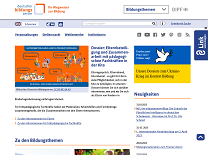Central-Eastern-European-Forum (CEE-Forum) – english information https://www.bildungsserver.de//bisy.html?a=8019&spr=1
„In 2005 the former Austrian Federal Ministry for Education, Science, and Culture (BM:BWK) together with the ÖZBF [Austrian Research and Support Centre for the Gifted and Talented] founded the “Central and Eastern European Forum for Gifted Education”. The objective of the forum is the exchange of experience and expertise in gifted education and research in the Central and Eastern European countries. So far, five “Regional Meetings for the Promotion of the Gifted and Talented” on various topics have taken place.“ The website offers the following publication for free download: Presentation of the 5th Regional Meeting for the Promotion of the Gifted and Talented in Salzburg (Austria) from October 11-12, 2010: Central Eastern European Forum: Early Childhood Education and Care. Promotion of the Gifted and Talented. [Source: Site editor’s information]

